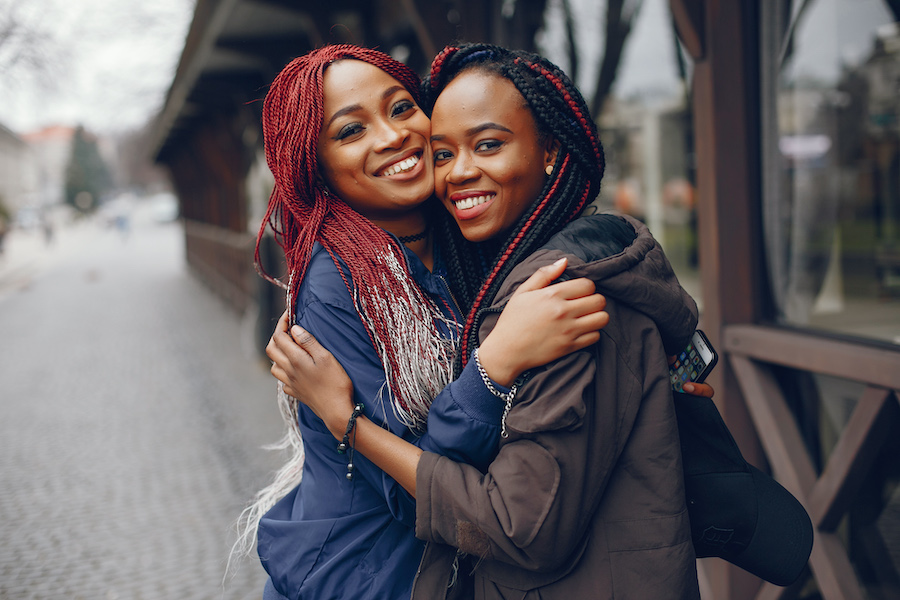The power of Black female friendships in predominantly White colleges
Leath, S., Mims, L., Evans, K. A., Parker, T., & Billingsley, J. T. (2022). “I can be unapologetically who I am”: A study of friendship among Black undergraduate women at PWIs. Emerging Adulthood, 10(4), 837–851.
https://doi.org/10.1177/21676968211066156
Summarized by Ariel Ervin
Notes of Interest:
- Evidence shows that Black students attending predominantly White institutions (PWIs) experience on-campus discrimination that negatively affects their sense of belonging.
- Research shows that friendships are an essential aspect of college student’s sense of belonging, in addition to their professional & personal development.
- However, there is a lack of scholarship that a) examines how Black college students in PWIs create a community to preserve and b) how the intersectional social identities of Black students affect their friendships and social networkers with their Black classmates.
- Black female friendships can promote identity development and become a source of affirmation. It also alleviates the detrimental effects of discrimination and identity-based bias.
- This study examines how Black undergraduate women in PWIs perceive their friendships with their Black female classmates.
- Identified themes:
- Friendship as a tool to mitigate bias and discrimination
- Affinity groups as a gateway to friendship
- Friendships as a way to navigate intersectional identity development
- Identified sub-themes:
- Affirming self-image
- Honoring their unique, intersectional experiences
- Black female friendships are homeplaces for Black female college students.
- Researchers need to make their Black samples more inclusive and diversified.
Introduction (Reprinted from the Abstract)
The current study explores Black undergraduate women’s friendships using in-depth interview data from 47 women (18–24 years) attending predominantly white institutions (PWIs) in the United States. Drawing on consensual qualitative research methods, we considered the nature and importance of Black female friendships among Black undergraduate women. We identified the following themes: (a) friendship as a tool to mitigate bias and discrimination; (b) affinity groups as a gateway to friendship; and (c) friendship as a way to navigate intersectional identity development. Two subthemes within the final theme highlighted how Black female friends (1) affirmed their self-image; and (2) honored their unique, intersectional experiences. Our findings demonstrate how Black female friendships are “homeplaces” for Black undergraduate women, particularly in regards to identity development during emerging adulthood. We discuss how friendships with other Black women offer unique forms of support during Black undergraduate women’s journeys in PWI environments that may challenge their wellbeing.
Implications (Reprinted from the Discussion)
Emerging adulthood represents a distinct period of identity development in which individuals reflect on their prior socialization experiences and develop new understandings of who they are and how they want to move through the world (Arnett et al., 2011). For Black women at PWIs, this may involve reflecting on dominant social perceptions of Black women (Jones et al., 2021; Winkle-Wagner et al., 2019), as well as the historical legacy of exclusion and displacement in higher education and society (Patton & Croom, 2017). In the current study, we added to extant literature on friendship during emerging adulthood (e.g., Barry et al., 2009), by exploring Black women’s friendships with other Black women at PWIs. In the company of other Black women, our participants were able to process their experiences of discrimination and misogynoir on campus, build social and professional networks with Black women who had similar interests, and move towards more affirmative understandings of their identities.
We built upon Goins’ (2011) study of Black female friendship groups as homeplace and hooks’s (1990) notion of friendship as, “the place in which a great majority of us have our first glimpse of redemptive love and caring community. Learning to love in friendships empowers us and enables us to bring this love to other interactions…” (p. 134). Similar to prior literature with Black college students (e.g., Borr, 2019), the women intentionally and strategically sought out friendships with other Black women as they adjusted to college, despite the limited number of other Black female students on their respective campuses. Consistent with evidence on the benefits of racially homophilous relationships and social networks among Black students (Jackson & Hui, 2017; Thelamour et al., 2019), we found that Black women offered one another significant forms of academic and social support during their time in college, particularly when they encountered bias and discrimination in the PWI environment. Our findings lend new insight regarding how friendships with other Black women on campus become a critical context for resistance, connectedness, and community.
To access this article, click here.









